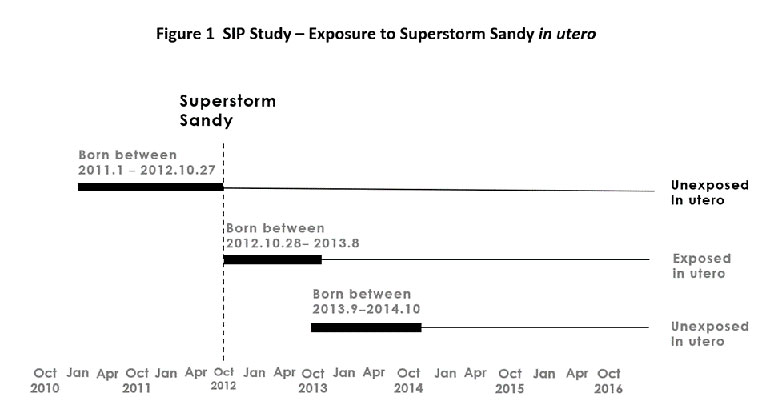New Research Shows Children Exposed to Natural Disasters in the Womb Have Higher Rates of Developmental Psychopathology in a Sex-Specific Manner
Findings are the latest in a longitudinal study following children born to mothers impacted by Superstorm Sandy

New data from the longitudinal Stress in Pregnancy Study (SIP Study) have identified earlier onset and higher rates of developmental psychopathology among children whose mothers were pregnant with them during Superstorm Sandy. In addition, the child’s biological sex determined specific patterns of elevated risks.
According to the research, conducted by researchers from the Icahn School of Medicine at Mount Sinai and the CUNY Graduate Center and published Wednesday, September 21, in the Journal of Child Psychology and Psychiatry, children prenatally exposed to the natural disaster that hit metropolitan New York in October 2012 had substantially increased risks for depression, anxiety, and attention deficit/disruptive behavior disorders compared to children who were not. Further, male children had distinctly and substantially elevated risks for attention deficit and disruptive behavioral disorders (including attention deficit/hyperactivity disorder (ADHD), conduct disorder, and oppositional defiant disorder), while female children had elevated risks for anxiety disorders, phobia, and depressive disorders (including separation anxiety disorder, generalized anxiety disorder, and dysthymia).
Researchers analyzed data collected from 163 preschool-aged children from diverse racial and economic backgrounds, 40.5 percent of whom were exposed to Superstorm Sandy in utero and 59.5 percent of whom were not, either having already been born prior to the storm or in utero following the storm. The team conducted structured clinical interviews with the children’s parents and reviewed available diagnostic health data on the participating children, whose median age at the initial clinical interview was 3.19 years.
“We’ve known for some time that maternal stress during pregnancy plays a key role in the mental health development of the child,” said the study’s Principal Investigator Yoko Nomura, PhD, a psychology professor at the CUNY Graduate Center and Queens College. “The SIP Study leveraged an unfortunate climate-related disaster and conducted a natural experiment to examine the impact of prenatal stress in utero on subsequent development and risks for developmental psychopathology during early childhood. Understanding these connections and distinctions grows more necessary every day with the increased frequency of natural disasters driven by climate change.”
The team’s recent findings, as well as those from a previous SIP Study examining underlying differences in placental transcriptomes, could help clarify the link between exposure to the effects of a natural disaster in the womb and the early risks of developmental psychopathology. Although the underlying mechanisms through which in utero exposure to a natural disaster negatively impacts early mental health development are still unclear, the growing body of research points to the important relationship between environmental and genetic effects.
“Our ongoing study elucidates the impact of environmental stress on the psychiatric development of preschool children and the elevated risks for early psychopathology in this population,” said Jeffrey Newcorn, MD, Professor of Psychiatry, and Pediatrics, and director of the Division of ADHD and Learning Disorders at Icahn Mount Sinai, a co-author on the study. “Most strikingly, the type of mental health problems very much depended on the biological sex of the child.”
Taken together, the SIP Study findings should serve as an important resiliency-strategy resource that informs health care professionals, policymakers, and educational institutions on the need for infrastructure that supports pregnant women and families exposed to climate-related natural disasters in order to mitigate early mental health risks and promote healthy childhood development.
This study was funded by the National Institute of Mental Health.
About the Mount Sinai Health System
Mount Sinai Health System is one of the largest academic medical systems in the New York metro area, with 48,000 employees working across seven hospitals, more than 400 outpatient practices, more than 600 research and clinical labs, a school of nursing, and a leading school of medicine and graduate education. Mount Sinai advances health for all people, everywhere, by taking on the most complex health care challenges of our time—discovering and applying new scientific learning and knowledge; developing safer, more effective treatments; educating the next generation of medical leaders and innovators; and supporting local communities by delivering high-quality care to all who need it.
Through the integration of its hospitals, labs, and schools, Mount Sinai offers comprehensive health care solutions from birth through geriatrics, leveraging innovative approaches such as artificial intelligence and informatics while keeping patients’ medical and emotional needs at the center of all treatment. The Health System includes approximately 9,000 primary and specialty care physicians and 10 free-standing joint-venture centers throughout the five boroughs of New York City, Westchester, Long Island, and Florida. Hospitals within the System are consistently ranked by Newsweek’s® “The World’s Best Smart Hospitals, Best in State Hospitals, World Best Hospitals and Best Specialty Hospitals” and by U.S. News & World Report's® “Best Hospitals” and “Best Children’s Hospitals.” The Mount Sinai Hospital is on the U.S. News & World Report® “Best Hospitals” Honor Roll for 2025-2026.
For more information, visit https://www.mountsinai.org or find Mount Sinai on Facebook, Instagram, LinkedIn, X, and YouTube.
